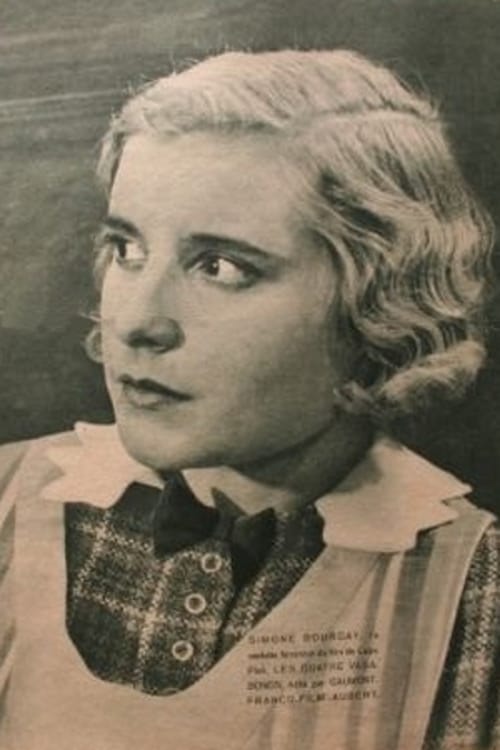Simone Bourday
Birth : 1912-08-23, Le Raincy, Seine-Saint-Denis, France
Death : 1943-12-27
History
Simone Bourday, real name Simone Edmonde Lourdelet, born August 23, 1912 in Raincy, died December 27, 1943 in Paris, is a French actress. (Wikipedia translated)

The film shows the seizure of power by the Nazis and Hitler wants a trial, at a time when France has just declared war on Germany (Sept. 3, 1939). Hybrid composition, it alternates originals and reconstructions performed by actors (docudrama). A not-so-subtle condemnation of Hitler, Nazism and Germany by the movie's French film makers, which conveniently makes no mention of how the policies of Great Britain and France created Hitler and allowed him to go as far as he did prior to the beginning of the Second World War.

After he loses a servant job when his employer's mansion burns down, a yokel makes money entertaining tourists in Breton garb, lands up appearing in a Paris show ,and meets another property owning lady, this one of dubious reputation.

During the French Revolution in 1793, a member of the Convention, seduced by the Comtesse de Beaulieu, helps her to discover the truth about the relationship between Agnès de Fitz-James and the count who was guillotined.

Marie Rose
In Vendée, an old farmer is gradually abandoned by his family who do not see their future in the fields. Only a cripple in love and abandoned remain at his side.

A gypsy has cast a spell on Livette, the fiancee of Renaud, the proud guardian nicknamed, King of the Camargue. Renaud wants to punish the witch who frightened Livette. But then, meeting the gypsy, he is taken under the strange spell that emanates from her. She arranges to meet him in an isolated hut in the middle of the muddy ponds. Livette, warned of her betrothed betrayal, goes to the place where she is to meet the infidel. But Renaud changed the stakes that line the only fordable passage. And Livette dies, even more from Renaud's betrayal.

Françoise
Filmed in French Morocco, Itto's dialogue is spoken primarily in the tribal Chleuh language. The jingoistic story concerns a series of clashes between French occupational forces and a rebellious Chleuh chieftain. Itto (Simone Berriau), chief's daughter, becomes embroiled in a romance with a Moroccan tribesman who has gone over to the French side. It is implied in Itto that it's okay to betray one's own people if it will preserve French colonialism in Africa. To modern viewers, the rampant chauvinism in Itto is a difficult pill to swallow.

Clara
A street singer becomes the star of the circus but his pal Armand shows him who his real friends are.

While walking back home at night, an examining judge is robbed of his watch. Fortunately he offers resistance and, by roughing up the mugger, manages to recover his belonging. Imagine his surprise when he realizes his thief is none other than... the President of the Court of Justice! How will the poor man behave with him knowing what he knows?

A brave woman is sentenced to prison on false testimony. She escapes twenty years later and takes refuge in Paris where she carries bread while looking for her children Georges and Lucie who will find her and exonerate her.

Thierette
Good King Pausole selects a wife for every day in the year, but one protests when he spends her day searching for young Princess Aline who has eloped with Giglio, a visiting airman stranded in the kingdom. Giglio comes from a modern and different world and this gives Queen for a Day some ideas about how to make her title a lasting one.

The singer Saltore is accused of the murder of his wife's lover, and is sentenced to ten years' hard labour. His daughter proves his innocence when she discovers the culprit to be his wife, who wanted to end an embarrassing love affair.

Suzel
The adaptation of a french novel from 1864 describes the idyllic life of a convinced bachelor, Fritz Kobus, in a village in Alsace. With help by the local rabbi, he does get married to young Suzel in the end.

Désiré Chopin, hunter on foot and friend of François de Crecy, uses a thousand tricks to encourage the love between François and Gaby. Little Margoton is in love with Désire who disdains her. She becomes the darling of the battalion.

Clémence

Ginette
A hawker, pursued by the law, finds refuge in a garage and finds there a former comrade who has become a mechanic. As he looks like a car driver, he finds himself forced to sit behind the wheel of a car to participate in a race, but not knowing how to drive, he finds himself dead last.

La rosière
In her village, Ms. Husson seeks to put a price under a rosiere but finding no worthy young pretty girl, hands it has Isidore, the village idiot, who becomes rosier

Now that they have inherited a huge sum of money Moïse Lévy and his brother Salomon are the prosperous owners of a a department store, the Galeries Lévy & Cie. Life is sweet but unexpectedly sours the day a fake Lévy cousin gets into their lives, claiming that the business is his, not theirs.

A poor youth of noble birth needs to marry. Will the cynical, calculating upstart who wants to set him on the right course be able to help?

Simone
A young provincial engineer sends romantic stories he has written to a cousin in Paris, who claims them as his own work.The writer comes to the city and for a while gets even with his relative by having a fling with the man's wife.

Denise, an orphaned girl, moves to Paris where she hopes to find work at her uncle's store. But the glamorous department store 'Aux Bonheur des Dames' across the street crunches all the little businesses around. She finds a position there.

Thérèse Martin
A chronicling of the life of Saint Therese of the Child Jesus and the Holy Face, a Catholic nun who died of tuberculosis at age 24.





